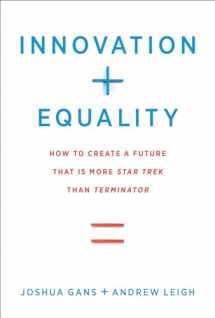
Innovation + Equality: How to Create a Future That Is More Star Trek Than Terminator
Book details
Summary
Description
How to get more innovation and more equality.
Is economic inequality the price we pay for innovation? The amazing technological advances of the last two decades―in such areas as artificial intelligence, genetics, and materials―have benefited society collectively and rewarded innovators handsomely: we get cool smartphones and technology moguls become billionaires. This contributes to a growing wealth gap; in the United States; the wealth controlled by the top 0.1 percent of households equals that of the bottom ninety percent. Is this the inevitable cost of an innovation-driven economy? Economist Joshua Gans and policy maker Andrew Leigh make the case that pursuing innovation does not mean giving up on equality―precisely the opposite. In this book, they outline ways that society can become both more entrepreneurial and more egalitarian.
All innovation entails uncertainty; there's no way to predict which new technologies will catch on. Therefore, Gans and Leigh argue, rather than betting on the future of particular professions, we should consider policies that embrace uncertainty and protect people from unfavorable outcomes. To this end, they suggest policies that promote both innovation and equality. If we encourage innovation in the right way, our future can look more like the cheerful techno-utopia of Star Trek than the dark techno-dystopia of TheTerminator.


We would LOVE it if you could help us and other readers by reviewing the book
Book review



